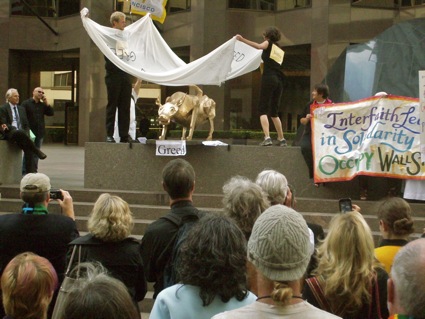The United Nations Population Fund picked the date of October 31, 2011, as the day when the earth’s population reached seven billion human beings. The news media have dodged the real story — the real story is that there are too many human beings on earth — and instead have been creating the story that we don’t really know exactly how many people there are on earth right now. In other words, instead of reporting on the disaster of human overpopulation, the news media are reporting on something that really isn’t at all important.
There are seven billion people on earth today, plus or minus a few tens of millions. All our current ecological crises have roots in overpopulation. There are too many people, and too many people require too many resources and cause too much pollution, so we are wiping out other species at an unprecedented rate, and there is every likelihood that soon we will wipe out our own species. This is the story that most of the news media are refusing to report on; I expect they think this story is too scary for the people who consume their news stories, too scary even for Hallowe’en. Heaven forbid the news media should lose even a few consumers by reporting the true state of affairs.
Last week, I had lunch with my friend Mike-the-science-fiction-fan. He half-jokingly suggested that we should apply the cap-and-trade principle to the human population: each person gets the right to have, say, two offspring; if you want to have more than two (that would be four offspring per couple), you would have to go out and buy the rights to have additional children from someone who has no children. Mike and I both liked this idea because neither of us has children, and we could both use a little extra money. — And yes, we were laughing uproariously as we talked about this, for this is a completely silly and impractical idea. Outside of China, it is impossible to conceive of a political situation in which you could actually implement such a scheme.
Nevertheless, it would be nice if our society were kinder to people who choose not to have children. Carol and I have chosen not to have children, and we still get people saying to us, “Oh, but you should have children, you’d make such good parents.” I’m not convinced that we would make good parents, but that’s not even the point. Instead of having a social norm that we are supposed to encourage people to have children whether they want them or not, we really need to evolve a new social norm. We should thank the people who do have children for taking the time and making the sacrifice that raising children inevitably involves, and we should also thank the people who choose not to have children for helping to reduce overpopulation. — And yes, now you can begin laughing uproariously, for this, too, is a completely silly and impractical idea.



